
GeroScience
Scope & Guideline
Exploring Innovations in Age Research
Introduction
Aims and Scopes
- Mechanisms of Aging:
This journal explores the cellular and molecular mechanisms that contribute to aging, including oxidative stress, cellular senescence, and changes in mitochondrial function. - Aging and Disease Correlation:
It investigates the relationship between aging and various diseases, particularly neurodegenerative disorders, cardiovascular diseases, and metabolic syndromes. - Interventions for Healthy Aging:
The journal publishes studies on interventions aimed at promoting healthy aging, including pharmacological treatments, dietary modifications, and lifestyle changes. - Biomarkers of Aging:
Research on identifying and validating biomarkers that indicate biological age, frailty, and the risk of age-related diseases is a key focus. - Translational Research:
GeroScience emphasizes translational studies that bridge laboratory findings with clinical applications to improve health outcomes in aging populations. - Animal Models of Aging:
Utilizing animal models, including mice, dogs, and non-human primates, to study aging processes and test potential therapeutic interventions is a significant aspect of the journal's research.
Trending and Emerging
- Interdisciplinary Approaches to Aging:
There is a growing trend towards integrating insights from various disciplines, including genetics, neuroscience, and social sciences, to create a more comprehensive understanding of aging. - Focus on Frailty and Functional Decline:
Research increasingly centers on frailty as a crucial indicator of health status in older adults, emphasizing the need for interventions that enhance functional capacity and quality of life. - Microbiome and Aging:
Studies exploring the relationship between the gut microbiome and aging are gaining prominence, highlighting the microbiome's role in healthspan and disease susceptibility. - Innovative Therapeutics and Senolytics:
There is a trend towards investigating novel therapeutics, particularly senolytics, which target cellular senescence to mitigate age-related health decline. - Personalized Medicine in Aging:
The emergence of personalized and precision medicine approaches tailored to individual aging profiles and genetic backgrounds is becoming a significant focus. - Neuroinflammation and Cognitive Aging:
Research on the role of neuroinflammation in cognitive decline and neurodegenerative diseases is increasingly prevalent, reflecting an understanding of the complex interplay between aging and brain health.
Declining or Waning
- Traditional Anti-Aging Therapies:
Research focusing on traditional anti-aging therapies, such as hormone replacement or simple dietary supplements, has seen a decline as more nuanced and mechanistic approaches gain traction. - Single-Factor Studies:
There is a noticeable decrease in studies that examine a single factor in isolation without considering the complex interactions involved in aging and health. - Epidemiological Studies without Mechanistic Insights:
While epidemiological studies are important, there is a waning interest in those that do not link findings to underlying biological mechanisms or therapeutic implications. - Animal Models with Limited Relevance to Humans:
Research utilizing animal models that do not effectively translate to human aging processes or health outcomes is becoming less common. - Emerging Technologies in Isolation:
The focus on emerging technologies such as artificial intelligence or big data analytics without integrating them into broader aging research frameworks is declining.
Similar Journals
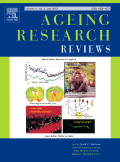
AGEING RESEARCH REVIEWS
Shaping Tomorrow's Solutions for Aging PopulationsAGEING RESEARCH REVIEWS, published by Elsevier Ireland Ltd, is a prestigious academic journal dedicated to advancing our understanding of the biological, psychological, and societal aspects of aging. With an ISSN of 1568-1637 and E-ISSN of 1872-9649, this journal has established itself as a leading resource in the fields of Aging, Biochemistry, Biotechnology, Molecular Biology, and Neurology, consistently ranked in the Q1 category across these disciplines as of 2023. For researchers, students, and professionals eager to explore cutting-edge findings and innovative methodologies, AGEING RESEARCH REVIEWS gathers comprehensive reviews that facilitate a deeper understanding of age-related processes. Its high impact factor and exceptional Scopus rankings—ranking #1 in Aging and #3 in Neurology—underscore its critical role in shaping contemporary aging research. This journal not only serves as a vital reference point but also fosters a collaborative space for the scientific community focused on improving health outcomes across the life span. Published continuously since 2002 and with a converging focus through 2024, AGEING RESEARCH REVIEWS remains committed to disseminating impactful knowledge that drives progress in our understanding of the aging process.

REJUVENATION RESEARCH
Empowering Research for Enhanced Quality of LifeRejuvenation Research is a premier journal dedicated to the advancing field of gerontology and aging research, published by Mary Ann Liebert, Inc. Established in 2000, the journal serves as a pivotal platform for the dissemination of scholarly articles that explore the complex mechanisms of aging and innovative approaches to rejuvenation. With an impact factor reflective of its robust scholarly contributions, the journal currently holds a Q4 ranking in Aging and a Q3 ranking in Geriatrics and Gerontology, showcasing its relevance in the academic community. This periodic publication, welcoming open access submissions, invites researchers, professionals, and students alike to engage with cutting-edge findings that could shape future geriatric practices and enhance quality of life. The journal underscores the importance of interdisciplinary collaboration, encouraging explorations that intersect with biochemistry, genetics, and other vital areas of study. Through its ongoing commitment to high-quality research, Rejuvenation Research remains a critical resource for understanding the biological underpinnings of aging and the strategies to mitigate its effects.
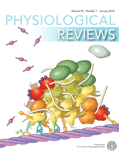
Physiological Reviews
Transforming Research into Comprehensive ReviewsPhysiological Reviews is a prestigious journal published by the American Physiological Society, dedicated to advancing our understanding of physiology across various domains. With an impressive impact factor that places it in Q1 quartiles for medicine, molecular biology, and physiology as of 2023, this journal is recognized as a leading source of high-quality reviews and research analyses. The journal has been a vital resource for the scientific community since its inception in 1945, providing in-depth and comprehensive insights that are crucial for both scholars and practitioners in the field. Although not an open-access publication, it remains widely accessible through institutional subscriptions, ensuring that crucial research findings are disseminated efficiently. With Scopus rankings that place it in the top percentile across multiple categories, Physiological Reviews continues to be an essential platform for the latest advancements and discoveries in physiology, making it indispensable for researchers, professionals, and students alike.
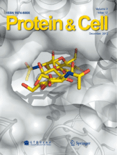
Protein & Cell
Fostering Global Knowledge Exchange in Biochemical ResearchProtein & Cell, published by Oxford University Press, is a distinguished international journal focusing on cutting-edge research in the fields of biochemistry, biotechnology, cell biology, and drug discovery. This open access journal, active since 2014, is dedicated to disseminating innovative findings that advance our understanding of protein functions and cellular processes, making it an essential resource for researchers, professionals, and students alike. With an impressive 2023 impact factor reflected in its Q1 ranking across multiple categories such as Biochemistry, Drug Discovery, and Cell Biology, 'Protein & Cell' stands at the forefront of scientific research, driving collaboration and discussion in the scientific community. Researchers can access the journal freely online, fostering a global exchange of knowledge and contributing to significant advancements in medicine and biotechnology. Located in the United Kingdom, the journal strives to be a pivotal platform for impactful research that influences future studies and applications.
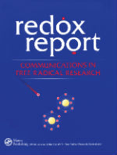
REDOX REPORT
Exploring Breakthroughs in Biochemistry and PhysiologyREDOX REPORT is a peer-reviewed academic journal published by Taylor & Francis Ltd, focusing on the latest advancements in the fields of biochemistry, clinical biochemistry, and physiology. Since its inception in 1996 and transitioning to an Open Access model in 2018, this journal has aimed to disseminate high-quality research findings and foster discussions within the scientific community. Positioned in the Q2 quartile across several relevant categories, including Biochemistry, Cell Biology, and Clinical Biochemistry, REDOX REPORT is recognized for its commitment to impactful research. The journal plays a crucial role in bridging the gap between fundamental biochemical research and its clinical applications, making it an essential resource for researchers, professionals, and students alike. With a consistent publication record extending to 2024, REDOX REPORT is dedicated to featuring cutting-edge studies that advance our understanding of redox biology, thereby contributing significantly to the ongoing dialogue in the life sciences.
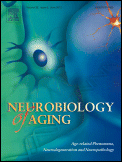
NEUROBIOLOGY OF AGING
Fostering Insight into Aging's Impact on the Nervous SystemNEUROBIOLOGY OF AGING, published by Elsevier Science Inc, is a premier journal dedicated to advancing our understanding of the complex interactions between the aging process and neurobiological mechanisms. With an ISSN of 0197-4580 and E-ISSN 1558-1497, the journal has established itself as a critical resource in the fields of Aging, Developmental Biology, Geriatrics and Gerontology, Clinical Neurology, and Neuroscience. Boasting a Q1 ranking in multiple categories, the journal is positioned within the top echelons of scholarly publication, underscoring its significant impact with an impressive Scopus ranking in various subfields. Committed to disseminating high-quality, peer-reviewed research, NEUROBIOLOGY OF AGING welcomes original articles, reviews, and research notes aiming to uncover the underlying processes of aging on the nervous system, fostering collaboration among researchers, professionals, and students alike. Although primarily subscription-based, the journal continues to play a vital role in shaping the discourse on aging and neurobiology, making it an essential publication for those engaged in this dynamic field.

Aging Medicine
Connecting Researchers and Practitioners in AgingAging Medicine, published by Wiley, is a pivotal open-access journal that has been at the forefront of research dedicated to the aging population since its inception in 2018. With a focus on both geriatric care and gerontology, the journal serves as a crucial resource for researchers, healthcare professionals, and students interested in understanding the complexities of aging and the related medical challenges. Although it holds a Q3 quartile ranking in the fields of Aging and Geriatrics and Gerontology according to the 2023 metrics, the journal continues to effectively disseminate valuable research and insights, helping to bridge gaps in knowledge and practice. With an E-ISSN of 2475-0360, it offers an open-access model that ensures broader accessibility to its published content, thus promoting collaboration and innovation across disciplines. As the journal converges towards 2024, it remains committed to evolving with the dynamics of aging research, making it a significant platform for the exchange of ideas and advancements in this essential field.

BIOGERONTOLOGY
Innovating Insights into Aging and Geriatric HealthBIOGERONTOLOGY, published by SPRINGER, is a premier journal dedicated to the interdisciplinary study of biological aging processes and their implications for health and longevity. With an ISSN of 1389-5729 and an E-ISSN of 1573-6768, this journal features cutting-edge research that addresses critical questions in the fields of aging, geriatrics, and gerontology. Ranking impressively in the top quartiles, particularly as Q1 in Gerontology, BIOGERONTOLOGY is recognized for its contributions to advancing the understanding of aging at both molecular and systemic levels. The journal’s rich repository of scholarly articles provides valuable insights for researchers, healthcare professionals, and students alike, fostering a deeper comprehension of age-related biological mechanisms. Although not an open-access journal, it is highly regarded with an impact factor that reflects its significant role in the academic community. The journal spans from 2000 to 2024, ensuring a broad historical context for its studies, and is based in the Netherlands, with its administrative office located at One New York Plaza, Suite 4600, New York, NY 10004, United States. Engaging with BIOGERONTOLOGY means joining a global dialogue on the science of aging and the implications it holds for humanity.

npj Aging and Mechanisms of Disease
Fostering Collaboration for Aging Innovationsnpj Aging and Mechanisms of Disease is a leading open-access journal dedicated to advancing the understanding of the biological mechanisms underlying aging and age-related diseases. Published by NATURE PORTFOLIO in the United Kingdom, this journal has established itself as a vital resource within the fields of Aging and Geriatrics and Gerontology, proudly holding a prestigious Q1 ranking in both categories as of 2023. With an impressive Scopus ranking, placing it in the top 10 for Geriatrics and Gerontology, and the top 9 for Aging, the journal is committed to disseminating high-quality, peer-reviewed research that offers innovative insights and fosters collaboration among researchers and practitioners. Since its inception in 2015, npj Aging and Mechanisms of Disease has embraced the open-access model, ensuring that groundbreaking findings are freely available to all, thereby promoting widespread knowledge-sharing within the scientific community. This journal serves as an essential platform for those seeking to explore the complex interplay of genetic, molecular, and environmental factors that influence aging and its associated challenges.

Lancet Healthy Longevity
Transforming Aging Through Interdisciplinary CollaborationThe Lancet Healthy Longevity is a premier journal published by Elsevier that focuses on advancing our understanding of healthy aging and longevity through interdisciplinary research. Established in 2020, this Open Access journal is committed to disseminating innovative findings that enhance public and individual health, making it accessible to a global audience. The journal is proud to be recognized with a Q1 ranking in critical categories such as Family Practice, Geriatrics and Gerontology, Health (Social Science), and Psychiatry and Mental Health, indicating its prominent role in shaping contemporary discourse in these domains. As one of the leading titles within the field, it holds an influential position in Scopus rankings, with top placements in Geriatrics and Gerontology as well as Family Practice, thereby reaching the 99th percentile of scholarly impact. The Lancet Healthy Longevity aims to foster collaboration among researchers, healthcare professionals, and policymakers to promote healthy longevity, ultimately supporting the growing aging population worldwide. With its commitment to high-quality research and global accessibility, this journal is a vital resource for those dedicated to improving health outcomes across the lifespan.